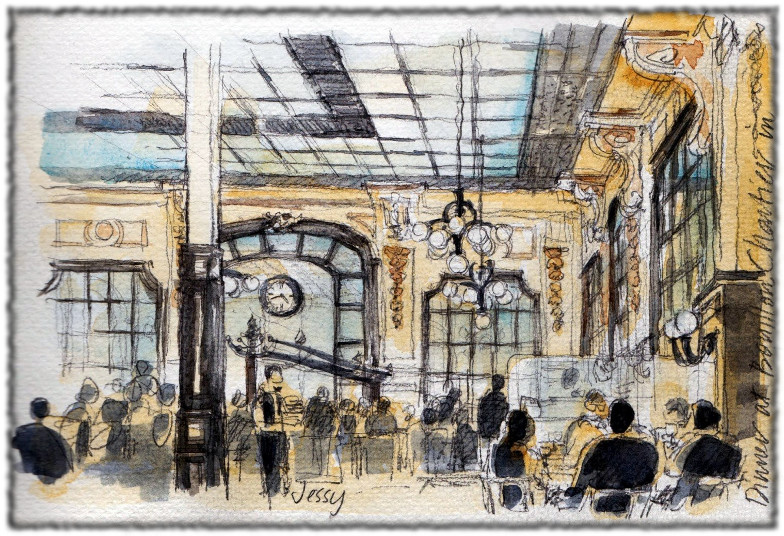Le Bouillon Chartier
Appearance
Le Bouillon Chartier lay ninety paces down a covered passageway between two businesses, a bakery and seamstress' shop. The covered walkway opened up into a small marble lined courtyard with tables arranged around the periphery. The entrance to the establishment was a wall of nineteenth century mullioned glass held in polished dark mahogany. The door lay on the right-hand side of the entrance and this afternoon it lay open to create a cross-breeze through the crowded dinning-room. The journey from the shaded courtyard with its dusty view of the crowded and bustling Rue de Faubourg to the dim elegance of the brasserie's interior was more than an entrance into a restaurant, it was a passage to paradise.
The vestibule was enclosed on two sides by glass and illuminated by diffuse afternoon light, and therein stood a man in his late forties with graying hair and dressed in a starched white shirt, black tie, black pants and vest with a white apron. He introduced himself as Félix and offered to take our coats, to which we both declined. Upon seeing the dirty urchin girl in my arms, the man merely quirked an eyebrow and led us to a table for four.
As we strode deeper into Bouillon Chartier, the frenetic energy of Paris was left behind for a microscopic universe of polite elegance and cultured service. Everywhere we looked, irrespective of class, Parisians dined in comfort while conversing quietly with both the staff and their companions. Momentarily our server slowed to allow both Vargo and I to take in the full enormity of the restaurant's ambiance. We passed darkly polished walls mounted with coat racks of burnished brass into a cavernous room lined from floor to waist in white veined brown marble. Upwards from that point, the walls were formed of fine creme stucco the shade of wheat or perhaps Navajo white with plaster of Paris moldings in dark goldenrod and embellished with gilding. This combination of light and airy above and dark and lustrous below gave the room a sense of immensity while still allowing the guests the comforting closeness of the darker wood colors. Transfixed at carefully chosen but regular intervals, mirrors bound into matrices of mahogany cast back the flickering illumination of gaslight from frosted glass fixtures to create an effect not unlike the Hall of Mirrors at the Palace of Versailles.
